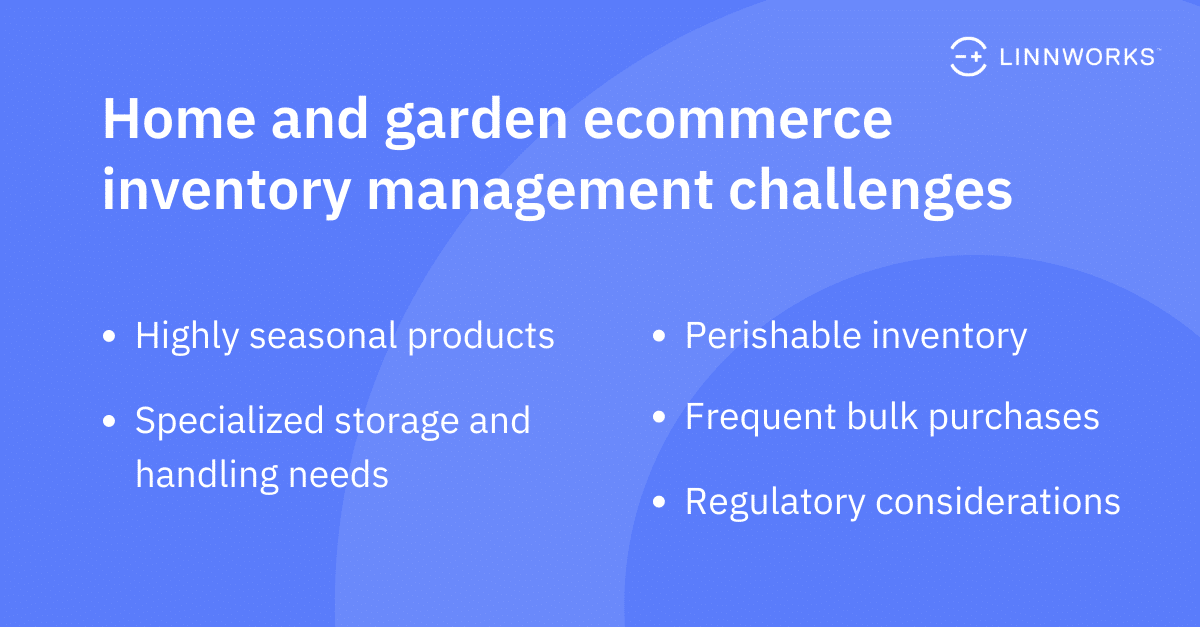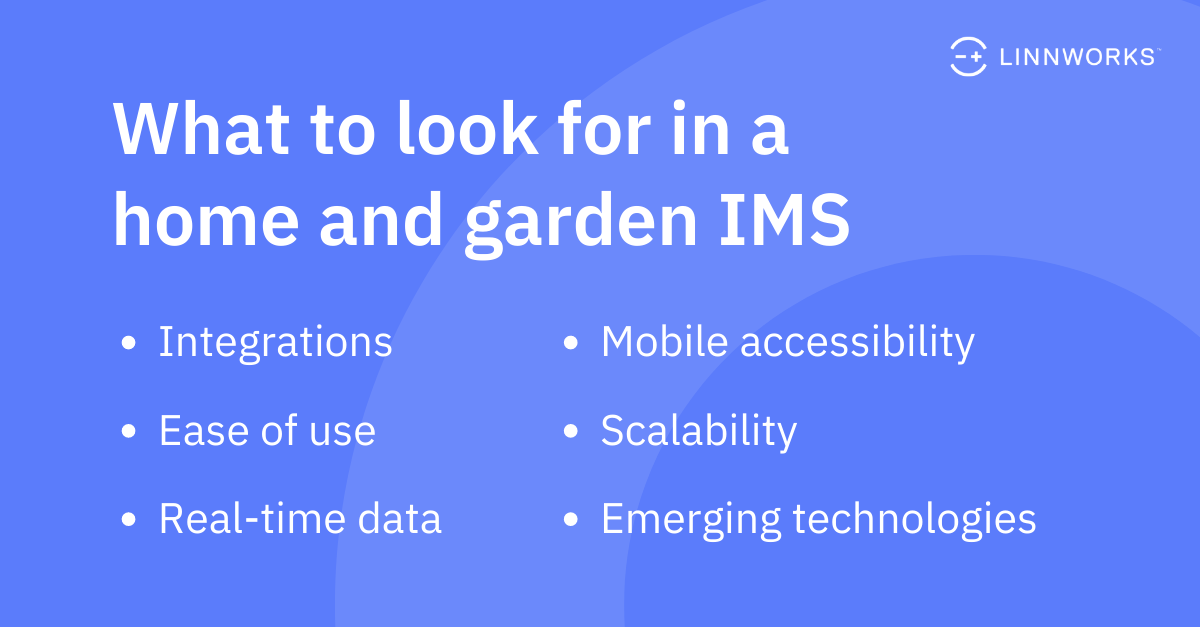A Complete Guide to Inventory Management for Your Online Plant Shop
Managing inventory is essential for every retailer, but online plant shops have the additional challenge of keeping products alive and healthy at every stage of the sales cycle.
These retailers handle seeds, seedlings, plants and trees, as well as gardening equipment and supplies. When managing a home and garden online store, effective inventory management is the only way to make sure your inventory and revenue stay healthy.
Whether you operate a large-scale nursery, an independent online plant shop or another type of lawn and garden store, you need the right software to ensure you have the right products in stock at the right time.
Learn more about the importance of inventory management for home and garden stores online, the industry’s unique challenges, and how to choose the right inventory software for your business.
What is inventory management for online plant sellers?
Inventory management is the process of organizing, tracking and controlling inventory within a business. In general, inventory management helps retailers have the right products in stock at the right time so they can meet customer demand.
For retailers in the lawn and garden category, the process is especially important because of the seasonal nature of many products. While many take pride in their green thumb level of care and quality, there are many varieties of plants that can’t survive in long-term storage.
Inventory management starts with keeping track of which products are selling and which ones aren’t. Another key is forecasting which products will be in demand during different times of the year.
Effective inventory management enables companies to optimize their product mix, whether that’s plants, gardening tools and whatever else customers want. It also helps sellers avoid stockouts, which can be especially detrimental during peak seasons like spring and summer.
To make this process easier, many online plant sellers rely on inventory management systems (IMS). These systems provide a centralized location for all inventory data, making it easy to track sales and inventory metrics.
An IMS can also automate tasks associated with managing inventory, such as tracking inventory levels and reordering products. A quality inventory management solution saves time and labor while providing a more accurate process.
Unique inventory management challenges for online plant shops
While all retailers face challenges with inventory management, there are specific considerations for online gardening stores and like-minded retailers trying to manage inventory. Learn more about challenges that are unique to this category.
Highly seasonal products
Many home and garden ecommerce products are seasonal, with spring planting season one example of a demand spike. Seasonality also varies depending on where you’re located and what plants you’re selling.
If you sell to customers in a variety of geographies, this complicates your efforts to forecast demand and set optimal inventory strategies. This doesn’t just apply to plants, as many gardening supplies, like fertilizer and weed killer, also have a limited shelf-life.
Specialized storage and handling needs
The nature of the garden category means retailers typically carry a variety of products, including small seed packets and large bags of soil and fertilizer. These products often require special plant care, including specific storage and handling.
For example, you need to keep some plants within certain temperature ranges or at specific humidity levels to prevent them from wilting or dying. Additionally, you need to store soil and fertilizer in dry places to prevent moisture from affecting their quality.
Storage is only one part of the equation, as retailers must also account for safe transport. This is a safety issue, not just a quality issue, as some products can be dangerous if handled improperly.
Limited space is another frequent challenge with online plant shop inventory. It’s important to plan for inventory levels that account for your physical space. In this industry, that calculation is dynamic because plants grow. As they get larger and mature, many plants require additional space or even new storage locations.
Perishable inventory
Most online plant shops’ products are perishable, and require careful attention to ensure they’re sold before they expire. Many of these products are also susceptible to weather conditions, such as extreme heat or cold, which can cause them to wilt or spoil.
Keeping garden products healthy is a unique challenge, and often requires additional equipment, like temperature control and watering systems. It may also require additional precautions, such as providing shade or shelter for plants during hot weather, or using frost covers to protect products from the cold.
Frequent bulk purchases
Purchasing lawn and garden products is often done in bulk. Whether it’s seeds, soil or fertilizer, buying in bulk saves money for businesses and their customers.
While bulk purchases have many advantages, they require a sound system for tracking large volumes of inventory moving in and out of your business. Bulk purchases also complicate storage, both in terms of available space and making stock easily accessible for fulfilling orders.
Regulatory considerations
Every business has to monitor legal and regulatory requirements. This is especially important for online retailers shipping perishable products such as plants, as regulations can vary depending on location or the type of product.
For example, some states have import restrictions on certain plants and plant materials. You might need to obtain permits or file paperwork to sell some products. Make sure you know what you can sell and where you can sell it — and that such information is available to everyone in the business who needs it.
If you plan to grow or sell patented plants, you’ll need to obtain permission from the original breeder. This can be a time-consuming process involving additional legal requirements, paperwork and costs.

The benefits of inventory management systems
Modern inventory management solutions help companies improve their operations and their real-time understanding of what’s happening in the business. Here are some of the specific benefits of an effective IMS.
Improved visibility and accuracy
An IMS reduces errors in the ordering and tracking process, ensuring that the right products are in the right place at the right time. Having accurate inventory data is especially important during busy seasons. Customers have a limited window to shop for their homes, gardens and lawns, and if you don’t have what they need, they’ll shop elsewhere.
Having full visibility into your inventory status and workflows helps companies make more informed decisions about which products to stock and when. Real-time visibility also helps you identify and address potential issues early, so you can be proactive instead of reactive.
For example, if your brand is adding a new line of fertilizers, your IMS can help you track inventory, orders and performance for all types of fertilizer being sold. This visibility and tracking ensures you make accurate and data-driven decisions about the products you carry.
Reduced wasteful spending
Most products carried by online plant sellers are perishable. An IMS reduces wasteful spending on products and materials by automating the ordering process so that the right quantities are ordered — and only when the business needs them.
In this industry, overstocking can lead to spoilage and waste, not just excess inventory and higher storage costs. An IMS improves order forecasting and informs what to do with products that aren’t moving fast enough.
Enhanced customer service
While major home and garden ecommerce retailers such as Home Depot and Williams Sonoma offer a wide variety of products from locations around the world, it can be a challenge for these larger companies to connect with customers on a more personal level and offer superior service and support. Instead, they entice customers with other offers, such as lower prices or free shipping. While these offers can be beneficial, customers aren’t only concerned about price.
Shoppers want a seamless, convenient shopping experience. An IMS ensures accuracy, timeliness and visibility into inventory, orders and fulfillment. Customers can complete orders without problems and receive their purchases in a timely fashion. This improves customer satisfaction and reduces the amount of time and money spent on customer service inquiries.
Effective inventory management also helps your forecasting, so you have a better chance of stocking soon-to-be-popular items ahead of customer demand. An IMS also helps if there are problems with a shipment that requires replacement products or returns. Customer service is especially important in fulfilling any problems with orders in a timely, accurate manner.
Increased efficiency
Manual inventory management processes are slow and create opportunities for errors. By automating the ordering process, an IMS speeds up the order management and fulfillment process, freeing up time and resources and saving money.
For example, by automating processes such as order fulfillment or restocking, businesses reduce the need for manual labor and can redirect investment to scale your business.
Increased profit
An effective inventory management solution improves efficiency, reduces costs and prevents wasteful spending, all of which contribute to profit. These tools can also improve profit over time as the business optimizes its inventory management further.
For example, an IMS can help you understand which plants or other products are the most in-demand for a specific period. This improves forecasting and ensures the right products are in stock at the right levels so the business meets demand without being stuck with products it can’t move.
What to look for in home and garden ecommerce inventory management software
Integrations
Your inventory management software should integrate seamlessly with other systems you use, such as point-of-sale (POS) systems and ecommerce platforms. Having data flow to one platform ensures the business has accurate and up-to-date inventory data.
Ease of use
The software you choose should be easy to learn and use, especially for nontechnical staff. An effective IMS should include an intuitive user interface, clear instructions and helpful support resources.
Real-time data
Real-time data is essential for effective inventory management. Choose software that provides real-time updates on stock levels, sales data and other key metrics.
Mobile accessibility
In today’s fast-paced business environment, employees need to access important systems and data wherever they are. Look for software that’s accessible on mobile devices or has a mobile app. Ensure that this convenience doesn’t sacrifice security — mobile access might require two-factor authentication logins or other measures to protect access and data.
Scalability
Your online plant shop will grow and change over time, so choose an inventory management software solution that can accommodate additional users, locations and product items as your business expands.
Emerging technologies
Technology drives business today. Just as adopting a modern inventory management solution is a step toward a high-tech operation, be on the lookout for other valuable technologies, including bar code scanning and radio frequency identification (RFID). Look for a platform that leverages automation and has a robust product road map that signals their continued investment in the IMS.

Grow your business with effective inventory management
Installing a home and garden ecommerce inventory management system is a big decision for any online plant shop. It’s important to do your research and choose a system that can handle the particulars of peak seasons and perishable products. Inventory management is an ongoing process. Make sure to select a provider that can offer the service and support needed to grow in all seasons.
Looking for new ways to improve the customer experience? Check out these five trends reshaping the future of ecommerce.